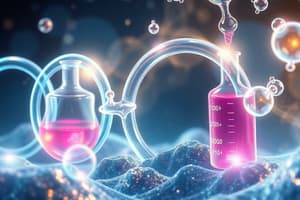Podcast
Questions and Answers
What type of intermolecular forces contribute to the high melting and boiling points of alkanes?
What type of intermolecular forces contribute to the high melting and boiling points of alkanes?
- Dipole-dipole interactions
- Van der Waals forces (correct)
- Ionic bonds
- Hydrogen bonds
Why are alkanes considered nonpolar compounds?
Why are alkanes considered nonpolar compounds?
- Absence of functional groups (correct)
- High electronegativity difference between carbon and hydrogen
- Partial charges on molecules
- Presence of double bonds
Which method can be used for the synthesis of alkanes by combining smaller molecules to form larger ones?
Which method can be used for the synthesis of alkanes by combining smaller molecules to form larger ones?
- Isomerization
- Oxidation
- Halogenation
- Polymerization (correct)
Why are alkanes insoluble in polar solvents?
Why are alkanes insoluble in polar solvents?
In which application are alkanes commonly used due to their flammable nature?
In which application are alkanes commonly used due to their flammable nature?
Which characteristic of alkanes makes them soluble in nonpolar solvents?
Which characteristic of alkanes makes them soluble in nonpolar solvents?
Flashcards are hidden until you start studying
Study Notes
Organic Chemistry: Alkanes
Alkanes are a class of hydrocarbons, which are compounds containing only carbon and hydrogen. They are the simplest organic compounds, and their properties are largely determined by the presence of single bonds between carbon atoms and the absence of functional groups. This article will cover the properties, synthesis, and uses of alkanes, focusing on the subtopic of alkanes.
Properties of Alkanes
Alkanes have several unique properties due to their structure. They are nonpolar because their molecules have no partial charges, making them insoluble in polar solvents but soluble in nonpolar solvents. They also have high melting points and boiling points due to their weak intermolecular forces. Additionally, alkanes are flammable and can be used as fuels in a wide range of applications.
Synthesis of Alkanes
Alkanes can be synthesized through several methods. One common method is alkylation, where a hydrocarbon is reacted with an organometallic compound to introduce an alkyl group. Another method is polymerization, where smaller alkane molecules are combined to form larger ones.
Uses of Alkanes
Alkanes have a wide range of applications due to their unique properties. They are used as fuels in both households and industrial settings. For example, natural gas is primarily composed of methane, an alkane, and is used for heating and cooking. LPG (liquefied petroleum gas), which is a mixture of butane and isobutane, is used as a fuel for heating and cooking in many parts of the world.
Alkanes are also used in the manufacture of other organic compounds. For example, alkanes can be oxidized to produce alcohols, aldehydes, and carboxylic acids, which are used in various industrial processes and consumer products.
Conclusion
Alkanes are an essential class of hydrocarbons in organic chemistry. They have unique properties and can be synthesized and used in a wide range of applications. Understanding alkanes and their behavior is crucial for anyone studying organic chemistry.
Studying That Suits You
Use AI to generate personalized quizzes and flashcards to suit your learning preferences.




